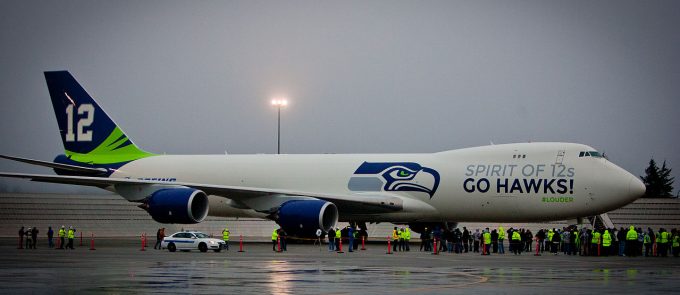Exclusive: Mark Drusch, new head of Qatar Airways Cargo reveals priorities – and energy
Speculation that Qatar Airways Cargo was not going to replace chief cargo officer Guillaume Halleux ...

Qatar Airways’ decision to take ownership of two 747-8Fs is in response to customer demand, it says, but it is still considering where to place the aircraft.
The first arrived in Doha this week, with the second expected in November. They were originally destined for other carriers; one was ordered by Silk Way West, and is less than a year old, but the Azerbaijani carrier decided not to take it up.
The second has also had a chequered history – at more than four years old, it has yet to operate on scheduled services. Originally ordered by Atlas, but cancelled, this early-build 747-8F went on Boeing’s books and was temporarily painted in Seattle Seahawks livery as it sat waiting for an airline to take it up.
So far, Qatar Airways’ freighter fleet has consisted of 12 777Fs (the 13th arrives next month) and eight A330Fs – so the 747-8F marks a departure for the carrier. (None of these aircraft are marked for retirement – fleet additions are entirely incremental.) However, for the past two years it has leased “up to two” of the aircraft type, said Qatar chief cargo officer Ulrich Ogiermann.
“Until now, they have been based on medium-term lease agreements as an interim position, in order to assess the sustainability of the dedicated charter and outsize market segment,” he said.
“We have grown very quickly into this market and customer feedback has been extremely positive, driving us to the decision to invest into a full ownership model.”
A fleet of two 747-8Fs can be difficult to manage, however. As one observer commented: “I wonder whether QR will operate a “step-child” fleet of just two 747-8Fs themselves?
“Boeing has looked at possibilities of cross-qualifying -8/-400/777 crews with a few carriers and concluded it was possible, but it was not entirely conclusive. If it’s quite inefficient to operate just the two aircraft, should we watch for CMI deal with Atlas?”
Mr Ogiermann said Qatar was considering its options.
“Our deployment over the next few months will be tactical, taking into consideration factors such as the pool of pilots required to operate most efficiently, slot and traffic right constraints and market dynamics.
“It is unlikely that we will see a fixed pattern of flying until early 2018,” he admitted.
Qatar is still operating under the Gulf state blockade, which it claims has triggered cargo volumes to rise 160%. Mr Ogiermann acknowledged that it had been a busy year.
“We have seen unprecedented demand levels across our entire network. 2017 has proven to be yet another record year in terms of volumes and earnings for QR Cargo.”
But he added: “At times like these however, quality can often be the corollary of sharp growth. But thankfully our investment in the new Doha has proven its capability, exemplified by the fact that we are now ranked number one for NFD [cargo and document-ready] by IATA for airlines reporting more than 90% of their volumes.”
Comment on this article